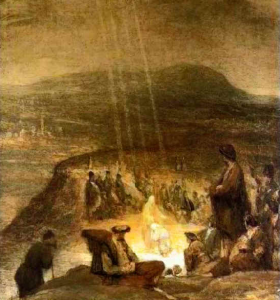by Fr. Patrick Henry Reardon
 From the traditional accounts of Jesus’ Baptism, the Gospel of John preserves only one detail: the descent of the Holy Spirit upon Jesus in the likeness of a dove. This detail is preserved, moreover, not directly in narrative itself, but in a quotation from John the Baptist:
From the traditional accounts of Jesus’ Baptism, the Gospel of John preserves only one detail: the descent of the Holy Spirit upon Jesus in the likeness of a dove. This detail is preserved, moreover, not directly in narrative itself, but in a quotation from John the Baptist:
“I saw the Spirit descending from heaven like a dove, and He remained upon him. I did not know him, but He who sent me to baptize with water said to me,
‘Upon whom you see the Spirit descending, and remaining on Him, this is He who baptizes with the Holy Spirit’” (John 1:32-33).
The Fourth Gospel indicates two features of significance in this detail: First, for John the Baptist the Holy Spirit’s descent proved a Christological proposition:
“And I have seen and testified that this is the Son of God” (John 1:34).
Second, this detail indicated a sacramental thesis: Jesus
“is he who baptizes in the Holy Spirit.”
Among the four gospel accounts of this event, only John explicitly stresses the permanence of the Holy Spirit’s descent on Jesus:
“He remained [emeinen] upon him”-“remaining [menon] on him.”
This Johannine detail of the Spirit’s descent has long been the object of Christian observation and comment. For example, St. Irenaeus of Lyons regarded it as indicating the spiritual renewal of the human race. He wrote on this point by way of commentary on Isaiah 11:2:
“The Spirit of the Lord shall rest [anapavsetai] upon him.”
Irenaeus also commented that the Holy Spirit
“descended on the Son of God (who was made the Son of Man) becoming accustomed with him to reside [skenoun] in the human race and to abide [anapavesthai] among men and to reside in the workmanship of God, accomplishing in them the will of the Father and renewing them from what is old to the newness of Christ” (Against the Heresies 3.17.1).
The Holy Spirit’s “abiding” on Jesus, for Irenaeus, referred to a renewed state of humanity by reason of the Incarnation.
St. Cyril of Alexandria pursued Irenaeus’ interpretation of the text, but he placed it within the Pauline theology of the New Adam. Into the body and soul of the first Adam, wrote Cyril, God had
“impressed, like a seal, the Holy Spirit, that is, the breath of life.”
Because of this creative activity, man’s nature was
“established for every kind of excellence, by virtue of the Spirit given to dwell in it.”
The old Adam, however, had failed to safeguard this state of grace. He and his seed had lost the presence of the Holy Spirit conferred on him at Creation. What was needed, Cyril believed, was a Second Adam, who would not forfeit the gift of the Holy Spirit. From the old Adam the Holy Spirit “flew away” (apepte), but on the Second Adam He came down and remained. The Spirit descended on Jesus, wrote Cyril,
“that He might become accustomed to remain [menein] in us” (Commentary on John, on 1:32-33).
Thus, the Holy Spirit, descending on Jesus at his Baptism, found a permanent and completely suitable dwelling in the human race. As the presence of the Holy Spirit was lost by fallen man, it was permanently recovered by Christ, the New Man who, at his baptism in the Jordan, received God’s transforming gift on our behalf and unto our benefit.
Irenaeus and Cyril understood the Baptism of Jesus, then, not as addressing a personal need on his part (for, as the Church later declared, the Son and Holy Spirit are homoousios with the Father), but in terms of Jesus’ relationship to those who adhere to him. Representing the human race, he received the Holy Spirit on our behalf—to be communicated to us.
In this respect, we may return to the significance author of the Fourth Gospel saw in the Spirit’s descent:
“This is he who baptizes with the holy Spirit.”
John’s Gospel portrays Jesus as the One who confers the Holy Spirit:
“He breathed and said to them, ‘Receive the Holy Spirit'” (20:22).
The Holy Spirit is the gift breathed forth upon the Church from the risen body of Christ.
It was with this same imagery that St. Paul contrasted the old Adam with the risen Christ. Recalling Genesis 2:7 (“And the Lord God . . . breathed into his nostrils the breath of life”), Paul commented,
“The first man was made unto a living being.”
But of the risen Christ, Paul said,
“the last Adam unto a life-giving Spirit” (1 Corinthians 15:45).
